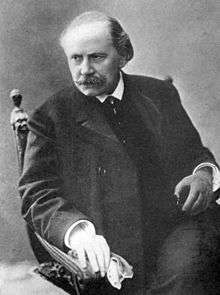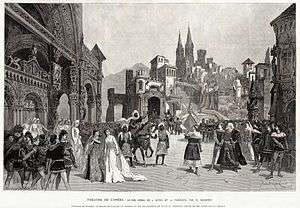Le Cid (opera)
| Jules Massenet |
|---|
 |
|
Operas
|
|
Oratorios
|
|
Ballets
|
Le Cid is an opera in four acts and ten tableaux by Jules Massenet to a French libretto by Louis Gallet, Édouard Blau and Adolphe d'Ennery. It is based on the play of the same name by Pierre Corneille.[1]
It was first performed by a star-studded cast at the Paris Opéra on 30 November 1885 in the presence of President Grévy, with Jean de Reszke as Rodrigue. The staging was directed by Pedro Gailhard, with costumes designed by Comte Lepic, and sets by Eugène Carpezat (Act I), Enrico Robecchi and his student Amable (Act II), Auguste-Alfred Rubé, Philippe Chaperon and their student Marcel Jambon (Act III), and Jean-Baptiste Lavastre (Act IV). The opera had been seen 150 times there by 1919 but faded from the repertory and was not performed again in Paris until the 2015 revival at the Palais Garnier. While the opera itself is not in the standard operatic repertory, the ballet suite is a popular concert and recording piece which includes dances from different regions of Spain.
Performance history
After the premiere, the Paris Opera continued to revive Le Cid until 1919,[2] reaching over 150 performances at the theatre by that date.[3] A new production was mounted at the Opéra in the 2014-15 season, conducted by Michel Plasson with Roberto Alagna and Annick Massis among the principals.[4]
Local premieres took place in Frankfurt, Antwerp, and Vienna in 1887, followed by Rome, New Orleans Geneva and Milan in the years following.[2] In New York, the premiere at the Metropolitan Opera House in 1897 was revived in 1901 and 1902, and a cut concert performance on 8 March 1976 at Carnegie Hall with Plácido Domingo and Grace Bumbry was later issued as a commercial recording.[2] In Saint-Etienne it was produced in 1979 then at the 1994 Massenet Festival under Patrick Fournillier with Michele Command and Chris Merritt.[2] Other modern productions include 1981 in San Francisco under Julius Rudel with Carol Neblett and William Lewis, 1984 and 1993 in Rouen, 1999 at Seville, and a 2001 production by the Washington Opera, starring Domingo, which was shown on PBS television,[5] and was seen in Zurich in January 2008.[6] In June 2011 the opera was staged at the Opéra de Marseille[7] in a production directed by Charles Roubaud, conducted by Jacques Lacombe, with Roberto Alagna singing the role of Rodrigue. This production was seen in March–April 2015 at the Paris Opera where the opera had not been staged since 1919, conducted by Michel Plasson, with Alagna reprising the title role, alongside Sonia Ganassi and Annick Massis.[8]
In September 2015, Odyssey Opera performed Le Cid for the first time in Boston. The performance was a semi-staged concert version conducted by Gil Rose, with tenor Paul Groves in the titular role, and received a positive review from the Boston Globe.[9]
Roles
| Role | Voice type | Premiere Cast, 30 November 1885 (Conductor: Ernest Altès) |
|---|---|---|
| Chimène | soprano | Fidès Devriès |
| Rodrigue | tenor | Jean de Reszke |
| Don Diègue | bass | Edouard de Reszke |
| Le Roi | bass | Léon Melchissédec |
| Le comte de Gormas | bass | Pol Plançon |
| L'Infante | soprano | Rosa Bosman |
| Saint Jacques | baritone | Lambert |
| L'envoyé maure | basse chantante | Balleroy |
| Don Arias | tenor | Girard |
| Don Alonzo | bass | Sentein |
| Chorus: Noblemen, Ladies of the court, Bishops, Priests, Monks, Captains and Soldiers, People ; Dancers (for 2nd Act ballet). | ||
Synopsis
Act 1
Tableau I
In Burgos, a hall in the Gormas palace.
To the sound of fanfares outside the friends of the Comte de Gormas recount how the King is to make Rodrigue a knight, despite his young age. Gormas desires to be named the governor of the Infant by the King. Gormas however approves the romantic attachment which his daughter Chimène has for Rodrigue. The Infanta has confessed to Chimène that she too loves Rodrigue, but as she is not allowed to love a mere knight Rodrigue could proceed to marry Chimène.
Tableau II
A gallery in the royal palace leading to an entrance to Burgos cathedral
With bells sounding, the people give thanks for victory over the moors. The King now rewards Rodrigue by knighting him (Ô noble lame étincelante), and Rodrigue swears his faith to Saint Jacques de Compostelle. The King next names Don Diègue as governor of the Infant, and this is seen as an insult by the Comte de Gormas and his friends. Don Diègue holds out his hand and wishes the marriage of his son and Chimène, but the count insults, swipes and disarms him. Cursing his loss of strength and old age, Don Diègue demands that his son revenges his honour. Rodrigue bemoans his fate, and the loss of his happiness, when he learns that the challenger is the father of his beloved.

Act 2
Tableau III
A street in Burgos at night.
Rodrigue wonders if he should allow himself to be killed by the count rather than kill him, to avoid the anger and hatred of Chimène, but he concludes that he owes more to his father than his loved one and that he must go ahead and seek vengeance. In the following duel he swiftly kills the count. A crowd and a jubilant Don Diègue arrive on the scene, but when Chimène rushes out to find out about the murderer of her father she faints when she discovers his identity.

Tableau IV
The main square of Burgos. It is a lively spring day
The Infante distributes alms and dancing follows: a castillane, andalouse, aragonaise, aubade, catalane, madrilène, navarraise (Ballet). Chimène demands justice to the King against Rodrigue and will hear of no pity or pardon for him. Don Diègue says that his son has only revenged him and that he should bear the accusation. The Infante feels her lost hopes revive. A moorish envoy brings a declaration of war to the King on behalf of his leader Boabdil. The King reproaches Rodrigue for having lost his most courageous captain and Don Diègue calls for his son to take the place of the count in battle. Rodrigue asks the King for a day of grace – the time to return victorious. The King consents and the people acclaim Rodrigue while Chimène in despair continues to demand justice.
Act 3
Tableau V
Chimène’s chamber, night.
Chimène gives way to grief (Pleurez! pleurez mes yeux…) at her dilemma. Rodrigue appears to say farewell but sad at having to go into battle with her hate behind him. As he departs, she calls on him to cover himself in glory to diminish his sins and to forget the past. She flees, ashamed to have allowed some hope of pardon for her father’s murderer.
Tableau VI

Rodrigue’s camp.
At evening the officers and soldiers from Navarre and Castille drink and sing. Prisoners and Moorish musicians wait on one side. After a drinking song and a Moorish rhapsody some of the soldiers want to leave, confronted by such a large army of moors.
Tableau VII
Rodrigue’s tent.
Rodrigue submits a fervent prayer (Ô souverain, ô juge, ô père) which is answered by the image of Saint Jacques announcing that he will be victorious. In thunder and lightning the tent disappears.
Tableau VIII
The camp ~ the battle.
At dawn soldiers run in groups, fanfares sound and all rush out, promised victory by Rodrigue.
 |
Pleurez! pleurez, mes yeux…
|
| Problems playing these files? See media help. | |
Act 4
Tableau IX
A room in the royal palace in Grenada.
Deserting soldiers tell Don Diègue that Rodrigue was killed in battle but he throws them out. He is more content with the noble and courageous end than the death of his son. The Infante and Chimène learn the news in despair and all three mourn Rodrigue. Chimène swears to them that she still loved him and that he believed himself loved of her as he died. Fanfares in the distance and cheers in the city warn her that Rodrigue still lives.
Tableau X
Royal courtyard in Grenada.
The crowd acclaim Rodrigue, named Le Cid by the chiefs of the vanquished moors. The King offers him rewards, but Rodrigue replies that only Chimène can name his fate. As she cannot pardon him nor demand his punishment, he will himself pass justice, and he draws his sword to kill himself. Chimène hesitates and pardons him through her declaration of love and the opera ends in general rejoicing.
Noted arias
- Rodrigue: "O noble lame étincelante"
- Chimène: "Pleurez, pleurez mes yeux"
- Rodrigue: "O souverain, o juge, o père"
References
Notes
- ↑ Milnes 1998, p. 862
- 1 2 3 4 Bégaud, Josée. "L’œuvre à l’affiche". In: L’Avant-Scène Opéra 161 – Panurge ~ Le Cid. L’Avant-Scène Opéra, Paris 1994, pp. 130-133.
- ↑ Art Lyrique Francais - Le Cid page accessed 14 August 2014.
- ↑ Opéra de Paris website, accessed 25 September 2014.
- ↑ The official authorized Website of Plácido Domingo | Repertoire/ Roles
- ↑ Koegler H. "Report from Zurich", Opera (London), April 2008, pp. 428-9.
- ↑ Opera de Marseille website
- ↑ Blanmont, Nicolas.Report from Paris, France. Opera, July 2015, Vol 66 No. 7, p858.
- ↑ "A local premiere for Massenet's 'Le Cid' - The Boston Globe". BostonGlobe.com. Retrieved 2016-05-15.
Sources
- Milnes, Rodney (1998), Le Cid in Stanley Sadie, (Ed.), The New Grove Dictionary of Opera, Vol. One. London: MacMillan Publishers, Inc. ISBN 0-333-73432-7 ISBN 1-56159-228-5
- Upton, George P.; Borowski, Felix (1928). The Standard Opera Guide. New York: Blue Ribbon Books. pp. 177–79.
External links
- Le Cid: Scores at the International Music Score Library Project
- Visual documentation of the premiere on Gallica